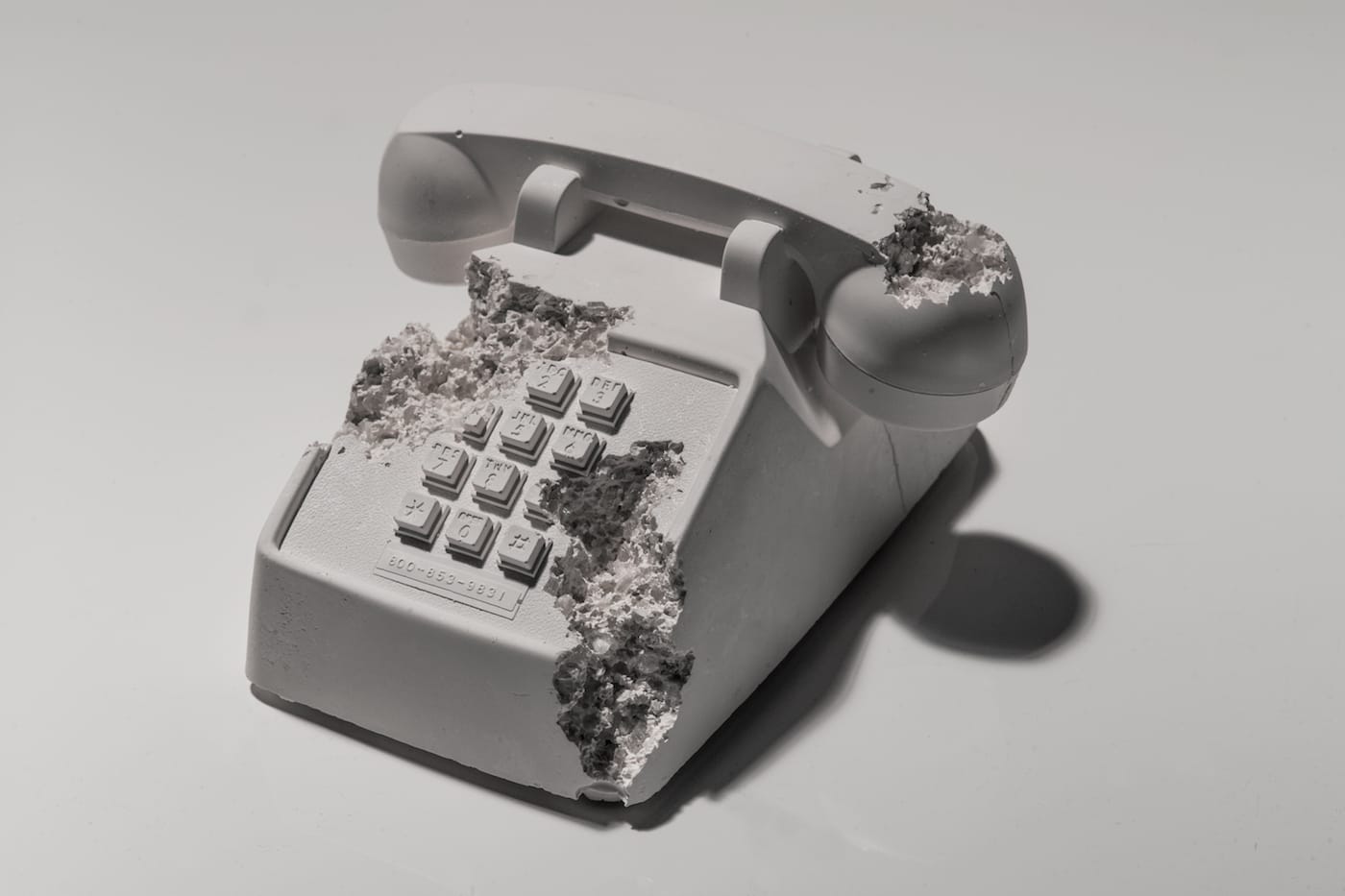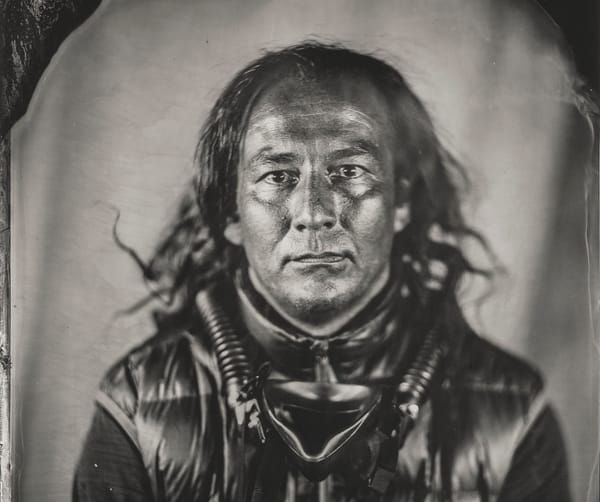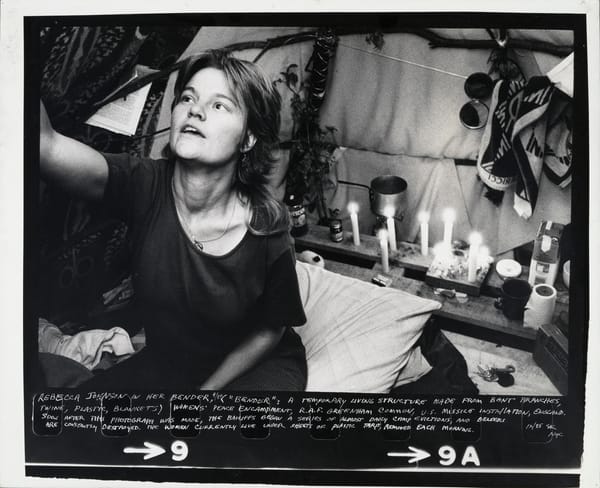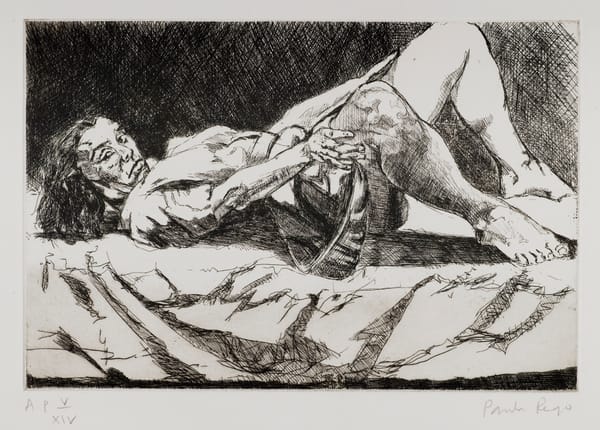One Poem by Emily Hunt
Our poetry editor, Wendy Xu, has selected one poem by Emily Hunt for her monthly series that brings original poetry to the screens of Hyperallergic readers.

LANDLINE
A phone was screwed
to the wall by the shower.
A clear one, with blue cords
so everything was visible.
The tangled system
of a single, labeled thing.
I thought: rows of them
coded, packed, stacks for sale.
Phones like sleeping backs in the dark.
How each current would twist
through the body of its device
snaking, tied to the others,
a fine line to the outlet
and live hot inside the wires.
*
When I used it,
spine against the tile,
splayed limbs,
a skating eye on the grout,
he would listen in
from the floor below,
a smooth receiver to his ear
in a room he called his office,
where he browsed the internet
for hours in the sun.
He would at times
bark into the phone,
like a dog, or just breathe.
He could pick it up,
my voice, cut it off.
Could then refer to it, enraged,
or ignore it, like dry clay.
Feral in this way
he could not be disturbed
raking the morning
or the late afternoon,
taking, resting,
boiling, a human in his way.
*
Warm soil, I would call
to get the endless drone
of the busy signal.
Concrete, pavement,
dandelions and tires I would trace
the rough curve of the school
making my way
to the spare room phone
extra slow to join
each mild shadow
as if to sidestep
the result, to push
through and past, to trash
the minutes, seconds, flipping into deep
bland hours, pillowy and cruel.
I thought: I would return
and I would return
to the bright, basement level
vacant evening classroom
where 1688 was written
in long loops of chalk
marking the vast, flat
lawn of the display
cold under flies and lint
in the lights when it rained.
Battle on the board,
body for something.
My recent history
local and beating.
Related I could draw
a number or a word,
a dry, wood base
and dirt for the flower
I could erase.
Could write the date,
my ride elsewhere
deep in a computer,
his sense of time gone.
*
When he slept heavily
at the head of the table,
a man in a chair,
shut down
flickering and drowned, a body
with a plate in front of him,
I would cross
with a groundless warm gaze
his long lashes, each linked
floating face in the room,
the mound of my food,
I would think my way through
the unified
regions of the brain.
The things that happened
bled into the language we exchanged.
*
I imagine that now
the psychotic hold
phones in their beds
and naturally like magnets
they absorb
hundreds of videos,
short ones, a quarter way through
or several times in a row,
gliding past pausing,
going suddenly loud,
mute, these screens
may perk or spark
a kind of rest or yield
the opposite effect,
as any wet free walk
through the woods or trip
to the store can,
any glued green
photo of a pea,
real pea in a cold can.
*
Verizon, mygreatlakes.org
therealreal.comaookgram
gmaiTwitrmymother calls
as I’m approaching
the shallow stone steps
leading up to the Main Branch
of the San Francisco Public Library.
100 Larkin Street, cool sun,
wind, clearing itself of the day,
so steady it’s unnoticeable.
Dry palm in its costume,
gold road leaning
toward a stuck tree.
Black leaves underneath.
Dirt below the buildings,
earth beneath the built dirt.
Hungry, my luck released
from the screen:
Marketing and
Communications
Assistant. Digital
Engagement
AssociateFarmfruits dried
mud ghost prints on tight yellow tents,
and as we talk the market closes
down with pleasure.
She tells me my brother is in jail
for threatening to murder
my parents at dinner,
then acting this out at full speed.
Pushing them down
to the ground, reaching again
like lightning
for a knife, cops and neighbors
staring, the moist air,
the moist eyes of strangers,
a narrowed glaring
public: Atlanta,
ivy and dimmed
flaming maples at night.
*
They tried to call him in there.
Then, they learned the rule.
He would not be reached,
his body in action,
his body at rest in the cell.
*
When he faded
heavily across from me
a boy in a chair,
with a plate in front of him,
his hair growing close
to his food, his food going
nowhere I would look at
his long lashes
and think my startled way
through the separate
young and flashing
regions of the brain.
That soaked place, crossing
a wet, live
wire to the famous mind,
having made with mud
the skull, having held in class
the pale human
organ with yellow gloves
larger than my hands
having drawn
the whole eye:
sight, as if it had been sliced,
colored in the freest liquid space,
to learn the shape,
having labeled
the pupil, having thought
to exchange the view as if
hanging a coat
on a branch it bled into,
turning, to arrive
at a future, drawn and scrolling,
to exchange
my roots for some roaming
poem online,
* * *
Emily Hunt is the author of Dark Green (The Song Cave, 2015), named a “standout debut” by Publishers Weekly and a “Must-Read Poetry Debut” by Lit Hub. Her work has appeared in PEN Poetry Series, The Iowa Review, TYPO, and many other journals. More work and info at emilyrhunt.org.




